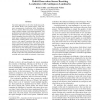Free Online Productivity Tools
i2Speak
i2Symbol
i2OCR
iTex2Img
iWeb2Print
iWeb2Shot
i2Type
iPdf2Split
iPdf2Merge
i2Bopomofo
i2Arabic
i2Style
i2Image
i2PDF
iLatex2Rtf
Sci2ools
116
click to vote
AAAI
2011
2011
Multi-Observation Sensor Resetting Localization with Ambiguous Landmarks
Successful approaches to the robot localization problem include Monte Carlo particle filters, which estimate non-parametric localization belief distributions. However, particle filters fare poorly at determining the robot’s position without a good initial hypothesis. This problem has been addressed for robots that sense visual landmarks with sensor resetting, by performing sensorbased resampling when the robot is lost. For robots that make sparse, ambiguous and noisy observations, standard sensor resetting places new location hypotheses across a wide region, in positions that may be inconsistent with previous observations. We propose MultiObservation Sensor Resetting, where observations from multiple frames are merged to generate new hypotheses more effectively. We demonstrate experimentally in the robot soccer domain on the NAO humanoid robots that Multi-Observation Sensor Resetting converges more efficiently to the robot’s true position than standard sensor resetting, and is ...
| Added | 12 Dec 2011 |
| Updated | 12 Dec 2011 |
| Type | Journal |
| Year | 2011 |
| Where | AAAI |
| Authors | Brian Coltin, Manuela M. Veloso |
Comments (0)

